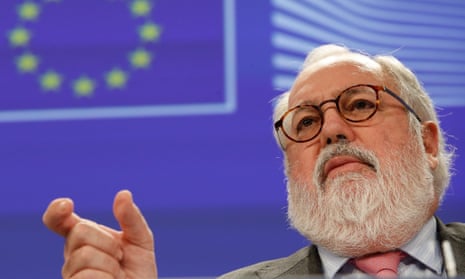A row has broken out over claims that the vast majority of lobbyists met by the EU’s top two energy and climate officials have been from the fossil fuel sector, big energy firms and heavy industry, since they took office six months ago.
Calendar records show that 94% of the EU climate commissioner Miguel Arias Cañete’s meetings have been with business lobbyists, mostly representing the heavy industry and fossil fuels sectors. For the vice president for energy union, Maroš Šefčovič, the figure was 70%.
Sources close to Cañete say that in practice, he held five group meetings with NGOs – rather than the two listed in the calendar – and gave five group updates to civil society groups at last December’s UN climate summit in Peru, bringing the true figure closer to 83%. They say he has championed climate action in informal dialogues, and improved upon the access record of his predecessor.
But Pascoe Sabido, a campaigner for Corporate Europe Observatory, complained of undue corporate influence.
“These lists of meetings show unrivalled privileged access for the most polluting industries, while public interest groups have barely featured,” he told the Guardian. “How the EU acts over the next few years both internationally and regionally will be key in deciding whether we avoid catastrophic climate change. But on this evidence, Cañete and co are too close to the fossil fuel industry to stop us careering head-first into a climate disaster.”
Cañete has had a mountain to climb in gaining the trust of European environmental groups, after the Guardian revealed that he held hundreds of thousands of pounds worth of shares in two oil companies, shortly before his appointment.
To some, the former oil mogul set an example by divesting himself of the holdings, and many green NGOs in Brussels say they have been impressed with his record.
“We have had more meetings with Cañete than with his predecessor, Connie Hedegaard,” Wendel Trio, the director of Climate Action Network (CAN) Europe told the Guardian. “In Lima it was quite exceptional. We never had that kind of access to Hedegaard during climate negotiations. We have no reason to complain at the moment.”
“The commissioner has a regular and ongoing dialogue with environmental groups in Brussels and during his international trips,” a spokesperson for Cañete said. “The very fruitful collaboration with the NGOs does not lead the commission to believe that other interest groups have a privileged access.”
However, among Cañete’s cabinet, 171 meetings with “business stakeholders” are listed on the official calendar, compared to nine with NGOs, eight with PR firms and think tanks, and nine with others. Commission sources say that in reality, they meet with NGOs two or three times a week, in talks considered so mundane that they may not be noted.
Other commissioners have stirred more ire from environmentalists than Cañete. In a meeting on Wednesday about carbon market reform, 10 industry groups backed by economic ministry officials from across Europe faced off against CAN and the European Environmental Bureau. The commissioner who organised the meeting, Elżbieta Bienkowska, has met with only one non-industry group – the European Trades Union Confederation – out of 23 listed meetings in her first six months.
Mark Johnston, a senior advisor to the European Policy Centre think tank described Cañete as a skilled bridge-builder and backroom operator, who had carefully assembled an expert team around him, in stark contrast to other commissioners.
But he said that plans for a new electricity directive showed that Cañete and Šefčovič had been ‘captured’ by the ‘Magritte Group’ of big energy utilities such as GDF Suez, E.On and Enel, who feature prominently in the commissioners’ calendars.
“It is dangerous as they have already set the agenda, captured the commission and the commission is doing their bidding,” he said. “Now the firms just have to watch and follow it through. If the UK scheme of operating subsidies – or ‘capacity payments’ – for legacy plants, such as coal, nuclear and gas is extended across the EU, which is what Cañete and others explicitly talk about, it will fundamentally slow down the energy transition.”
A consultation paper for a new electricity market design will be presented in July before legislation is brought forward by the two commissioners next year.
A spokesman from Šefčovič’s office stressed that the vice president was receiving good advice from trade unions and environmental groups, as well as industry. “This will provide a balanced input from all policy areas concerned by energy and climate issues,” the official said. “It is important to have first-hand impressions from various stakeholders and to listen to a wide range of voices from all parts of society.”
Nonetheless, some environmentalists fear that lop-sided inputs may affect the commission’s output when it comes to crunch policy decisions.
“Access is currency in the lobby game and there is no denying fossil fuel companies have deeper pockets and more influence,” said Brook Riley, a spokesman for Friends of the Earth Europe. “This dangerous imbalance could prevent us from making the urgently needed transition to a safe, clean and fair energy system.”

Comments (…)
Sign in or create your Guardian account to join the discussion